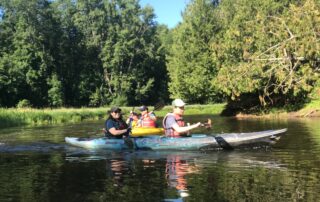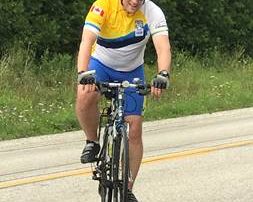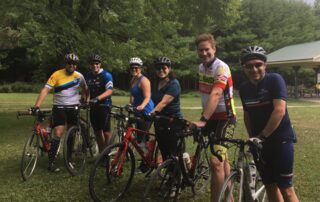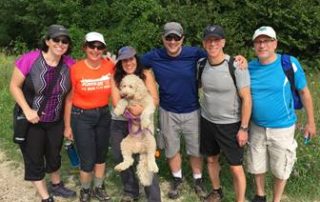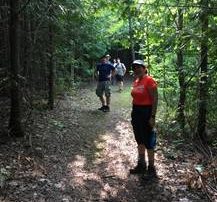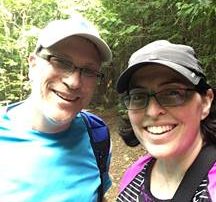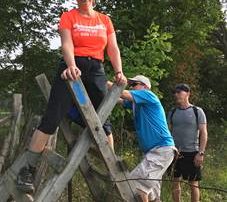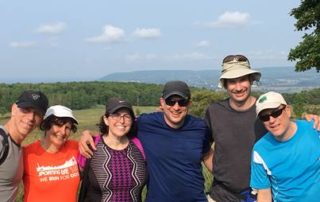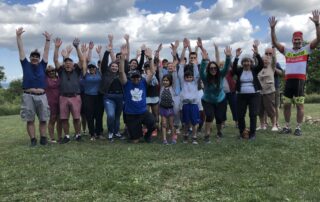BAILEY DANIELS MEMORIAL FUND FOR NEUROENDOCRINE RESEARCH
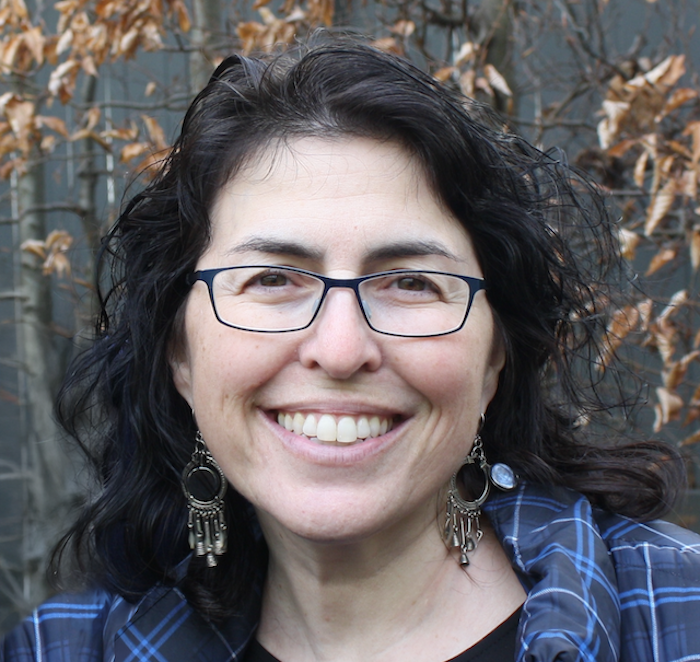
In loving memory of Bailey Daniels, a beacon of hope and a pillar of strength in the neuroendocrine cancer community, we gather our thoughts and hearts to honour a journey marked by courage, determination, and an unwavering commitment to make a difference. Bailey’s twenty-two-year battle with pancreatic neuroendocrine cancer was not just a personal fight but a transformative mission that touched the lives of many.
Bailey’s passion for research and advocacy for NET patients was fueled by a genuine respect for the scientific community and a desire to contribute constructively to ongoing studies. As a patient, she was deeply invested in the research process, eager to represent the patient voice and influence the trajectory of scientific inquiry. Her intellectual curiosity, critical analysis, and thoughtful feedback were invaluable contributions to the NET research field.
The Daniels KBH Triathlon, initiated in 2018, stands as a beacon of Bailey’s enduring legacy, symbolizing her dedication to advancing research and supporting those affected by neuroendocrine cancer. Her story is one of unwavering courage, profound generosity, and a deep-seated desire to make a lasting difference in the world. Bailey Daniels will be remembered not only for her battle against cancer but for the countless lives she uplifted and the hope she instilled in the hearts of many.
DANIELS CONSTELLATION FUND FOR NEUROENDOCRINE RESEARCH
The Bailey Daniels Memorial KBH Triathlon was launched in 2018 by Bailey and Jonathan Daniels, who aimed to raise money for neuroendocrine cancer research. It has since grown to include multiple fundraisers who have come together to raise funds for the Bailey Daniels Memorial Constellation Fund for Neuroendocrine Cancer Research, which works with the Canadian Neuroendocrine Tumour Society (CNETS) to deliver grants to researchers. Why is it called the “Constellation Fund,” you may be wondering? Because our donors are our stars!
What is neuroendocrine cancer?
Neuroendocrine tumours, or “NETs,” are cancers that can develop anywhere endocrine cells are present. These cells are found throughout the body, but the most common places for NETs to develop are in the gastrointestinal tract, lungs, and pancreas. Tumours may also originate in other parts of the body such as the thyroid, thymus, adrenals, paraganglia, ovaries and testes. Some neuroendocrine tumours produce excess hormones which cause symptoms such as diarrhea, flushing and nausea. Others don’t release hormones or don’t release enough to cause symptoms.
Once considered rare, NETs are typically slow-growing, but are now increasingly common, accounting for approximately 2% of all cancers. Neuroendocrine cancer can be difficult to diagnose because symptoms often mimic other conditions, so NETs are often misdiagnosed as something else. It is common for patients to make many visits to the doctor over several years before an actual diagnosis is made; sometimes it takes up to 10 years from first symptoms to diagnosis.
Neuroendocrine cancer has a very low profile, partially because of its relatively low rate of incidence, but also because the media, on the rare occasions when the topic arises, tends to misleadingly refer to the site of origin rather than neuroendocrine cancer. Steve Jobs and Aretha Franklin, for example, are usually both said to have died from pancreatic cancer, when it was actually neuroendocrine cancer originating in the pancreas.
What is CNETS?
CNETS was established in 2007 and is the central body supporting the neuroendocrine patient community in Canada. It is a charitable organization that funds research, supports clinical trials, and improves the quality of life and survival for neuroendocrine cancer patients by educating them about treatment options, providing support, and raising awareness of the disease. This is so important for an illness where there is not a single standardized treatment path or cure and the medical community is mostly unaware or undereducated, with a relatively small number of experts.
CNETS runs an annual NET Research Grant Competition. Before the first KBH in 2018, CNETS was able to fund two $40,000 annual research grants through its own fundraising, but we were collectively able to have a significant impact by funding an additional grant each year.
What is the Bailey Daniels Memorial KBH Triathlon?
The KBH Triathlon format is 8 km kayaking, 40 km biking, and 8 km hiking, all in the Blue Mountains/Beaver Valley Region of Ontario. It is not a competitive format, but a fun, athletically demanding yet social event with a short scenic lunch break. The event kicks off at 8:30 am and generally takes the whole day. The 8th Annual Bailey Daniels Memorial KBH will be taking place on Saturday, August 9th, 2025.
In previous years, we raised $27,400 in 2018 (topped up by CNETS to fund a full grant), $42,400 in 2019, $43,842 in 2020, $49,135 in 2021, $50,029 in 2022, $58,071 in 2023, and $48,900 in 2024. Altogether, including an additional $56,294 we raised after Bailey passed away in 2024, prior to this campaign we have raised $377,121.
For 2025, we aim to raise a minimum of $50,000! The minimal expenses associated with the triathlon are covered by the founders so all money raised (other than the Canada Helps admin and credit card fee) goes purely towards research.
So far, the money raised has gone towards the following:
The 2018 Daniels Constellation Grant for Neuroendocrine Cancer was awarded to Dr. Sten Myrehaug, whose study is looking at whether priming NETs using radiation may produce improved immunotherapy results in NETs patients.
The 2019 Daniels Constellation Grant for Neuroendocrine Cancer was awarded to Dr. Simron Singh and Dr. Ur Metser for their study that is examining whether combining two different types of patient imaging produces more prolific results that will help doctors to individualize treatment strategy for neuroendocrine cancer patients.
The 2020 Daniels Constellation Grant for Neuroendocrine Cancer was awarded to Dr. Jonathan Abele for his study evaluating metastatic NETs with three different PET radiotracers (68Ga- DOTATATE, 18F-DOPA, and 18F-FDG) to determine which imaging technique best identifies lesions that may respond to PRRT molecular therapy.
The 2021 Daniels Constellation Grant for Neuroendocrine Cancer was awarded to Dr. Iacovos Michael. His study is constructing a comprehensive tissue microarray from gastroenteropancreatic NET patients’ archival tissue and analyzing two specific molecular subtypes, MLP and YAP-OFF, to learn if they can aid in the stratification and prognostication of patients, guide patient-specific treatments, and ultimately improve quality of life and overall survival.
The 2022 Daniels Constellation Grant for Neuroendocrine Cancer was awarded to Dr. Lucy Ma. Her study will investigate the use of plasma whole genome sequencing to detect molecular residual disease (MRD) in patients with resected GEP-NET and evaluate the underlying biologic mechanisms that lead to recurrence.
The 2023 Daniels Constellation Grant for Neuroendocrine Cancer was awarded to Dr. Lina Chen, whose study will examine the tumour microenvironment (TME) of 600 archival GEP-NENs and use single-cell RNA sequencing to study how genes are active in individual cells. This project will identify new prognostic and predictive biomarkers that could improve management strategies for patients with GEP-NENs
The 2024 Bailey Daniels Memorial Constellation Grant for Neuroendocrine Cancer was awarded to Dr. Jesse Chao – a Scientist at Sunnybrook Research Institute. Dr. Chao’s research focuses on Transforming PanNET Classification Through Decoding Tumour Microenvironment Using Spatial Transcriptomics and AI.
When did Bailey Daniels Die?
Bailey Daniels passed away from NETs on December 5, 2024, after a 22-year battle with cancer. The Daniels KBH Triathlon was renamed the Bailey Daniels Memorial KBH Triathlon in her honour. Bailey was posthumously awarded the King Charles III Coronation Medal for her work with CNETS in March 2025.
Her family misses her deeply but are so excited to continue her legacy by fundraising for the Bailey Daniels Memorial KBH.
The KBH Triathlon combines three outdoor activities with the challenge of doing them in succession in one day: KAYAKING, CYCLING, & HIKING!
Bailey was featured in a CNETS Zebra Chat where she shared details of her long journey with NET cancer and how she has given back to the NET cancer community over the years. Check out Bailey’s Zebra Chat.







